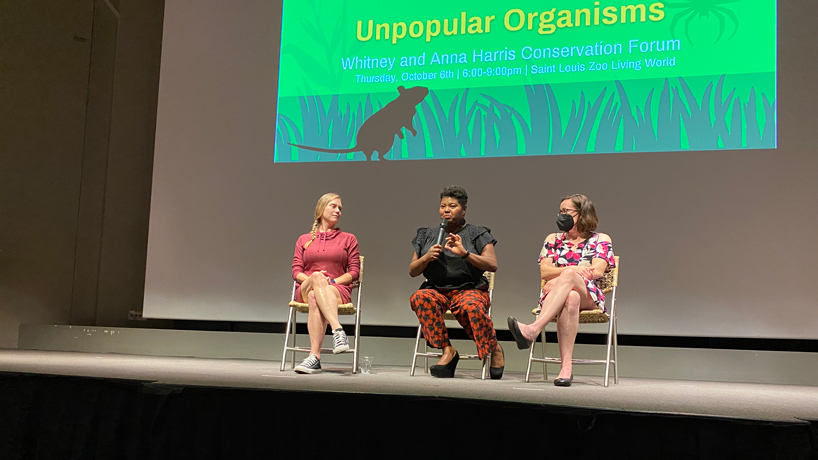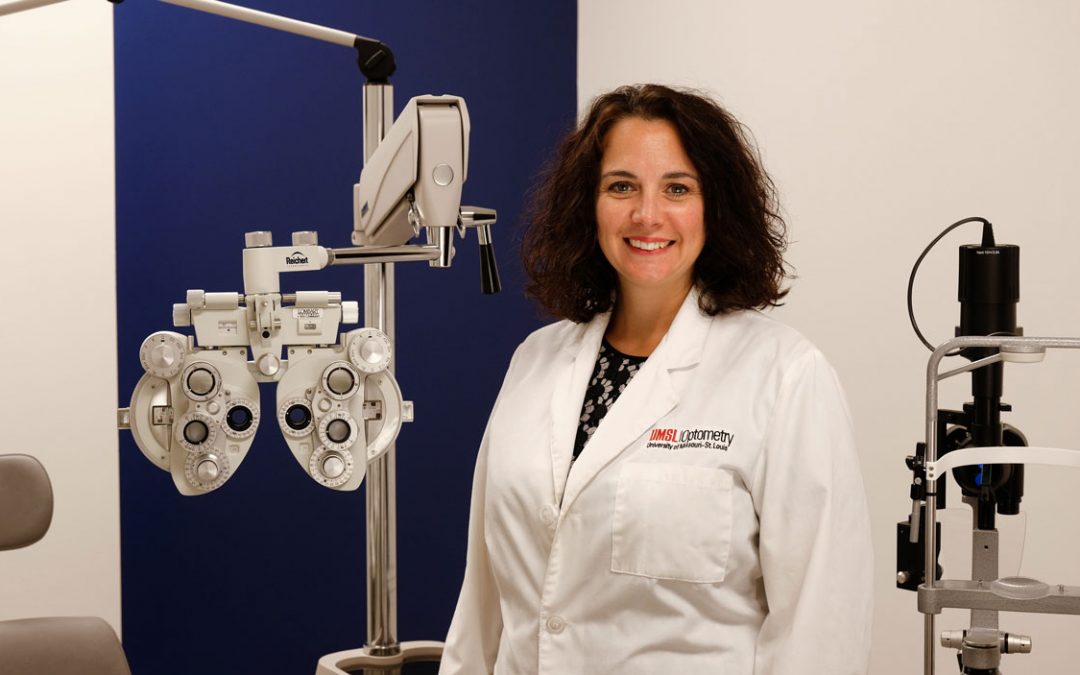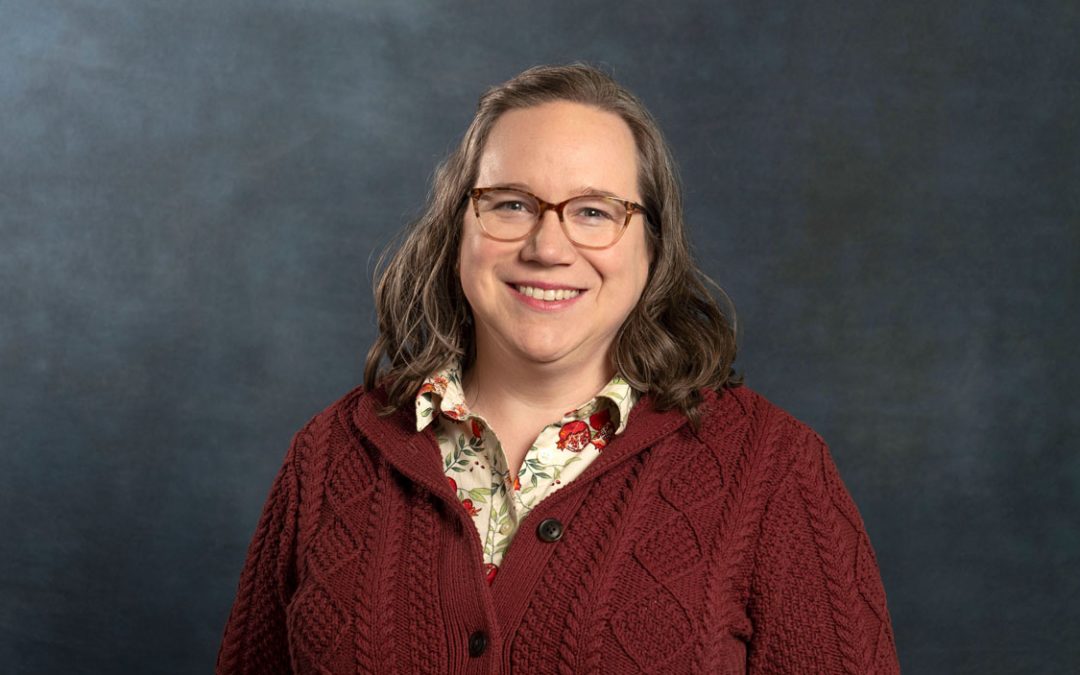
Danielle Lee (center), an associate professor of biology at Southern Illinois University Edwardsville who earned her PhD in biology at UMSL in 2010, answers a question from the audience during the 2022 Whitney and Anna Harris Conservation Forum last Thursday at the Saint Louis Zoo. Lee served as a presenter for the forum on “The Importance of Unpopular Organisms” and was joined by Kasey Fowler-Finn (right), an associate professor of biology at Saint Louis University, and Nicole Miller-Struttmann (left), an associate professor of biology at Webster University. (Photo by Burk Krohe)
In recent years, there’s been a movement toward more natural backyards and outdoor spaces and away from monoculture turf lawns that were once the American ideal.
The push to preserve biodiversity has been fueled by the general public’s greater awareness of phenomena such as worsening droughts and declining insect populations. It’s led scientists and policymakers to think more critically about the importance of the creatures and plants many of us spend time and money trying to manage or eliminate.
The 2022 Whitney and Anna Harris Conservation Forum, “The Importance of Unpopular Organisms,” explored the world of insects, rodents and weeds and what we can learn from them. The annual event was held jointly last Thursday evening by the University of Missouri–St. Louis‘ Whitney R. Harris World Ecology Center and the Saint Louis Zoo inside the zoo’s The Living World.
“As biologists, many of us spend our scientific lives working with animals and plants that most people are just not quite as enthusiastic about as we are,” said Aimee Dunlap, associate professor of biology and co-interim director of the Harris Center. “There’s much love for the pandas and not so much for the amazing diversity of rodents. Bumblebees can gain much affection from the public, but their Hymenoptera cousins, the wasps, not so much. There are so many cool aspects of nature we can witness in our own backyards.”
During the forum, about 50 attendees heard presentations from three St. Louis area biologists: Kasey Fowler-Finn, an associate professor of biology at Saint Louis University; Danielle Lee, an associate professor of biology at Southern Illinois University Edwardsville who earned her PhD in biology at UMSL in 2010; and Nicole Miller-Struttmann, an associate professor of biology at Webster University.
Fowler-Finn presented first and highlighted how the insects and arachnids found in and around our homes communicate through vibration. She noted that they provide important ecological functions such as sanitation services and biological control, but they can also be sources of beauty and ingenuity if you look, and listen, closely enough.
“I think their importance really extends beyond these ecosystem services,” she said. “They really act as a source of true wonder and amazement. That’s what I’m hoping to impart to folks tonight.
“I want to touch on a certain aspect of the world that spiders and insects share, which is the reliance on sound. My goal is not to convince you of the importance in the ecosystem, but the importance of understanding how other organisms navigate the world in ways that we don’t normally think about.”
Lee spoke next and recounted humans’ long history with nuisance rodents, pointing to accounts from antiquity in Egypt as well as lore such as the Pied Piper.
“Rodents have been our uninvited, but longest lasting, familiars throughout all of human history,” she said.
While nuisance rodents’ undesirable reputation is earned – they carry diseases and are responsible for billions of dollars of agricultural damage each year – Lee noted that they are also incredibly adaptable and thrive in urban, peri-urban and natural environments. Because of this resilience and rodents’ continued proximity to humans, she argued humans must prioritize studying rodents to propose effective institutional solutions to the problems they create.
In her own research on field mice in Missouri and Illinois and the giant pouched rat in Tanzania, Lee found that rodents have spatial preference use patterns.
“As a natural historian studying a nuisance rodent, I recognize that understanding this rodent can impact lots of different fields – public health, biomedical research,” Lee said. “In other words, having this basic natural history informs things like how we manage parks, how we manage green spaces, how we should invest in sound infrastructure. It also impacts understanding how we become more ethical and better scientists and community members moving forward.”
Miller-Struttmann discussed common weedy plants such as clover, goldenrod, pokeweed, Virginia creeper and wild violet. While these plants are often removed from lawns in favor of grass seed, they have many practical uses and benefit local ecosystems. Miller-Struttmann celebrated the uniqueness and utility of each maligned plant with a haiku poem before cataloguing their many benefits.
She sang the praises of wild violet, which can be used to make delicate floral flavored jelly or vibrantly colored dyes, and pokeweed, a plant that has been foraged for generations in the American South and served as a nutritious substitute – after boiling several times – to pricier leafy green vegetables.
Audience members also learned about passion flower’s use as an anti-anxiety medicine and mild sedative, Virginia creeper’s vital role as caterpillar food and clover’s protein packed foliage, which fuels cattle and dairy cows.
Before the three fielded questions from the audience during a lively panel discussion, Miller-Struttmann closed her remarks with two more haikus.
“Just misunderstood, weedy plants have benefits, for those who know them,” she said. “It’s been my pleasure, to share these under loved plants, thank you for joining.”














